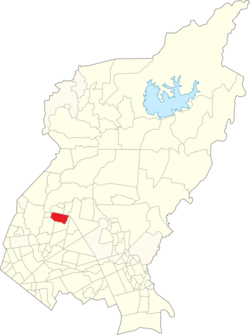Veterans Village
| Veterans Village | |
|---|---|
| Barangay | |
 Map of Quezon City showing Veterans Village |
|
| Location of Veterans Village within Metro Manila | |
| Coordinates: 14°39′15″N 121°1′26″E / 14.65417°N 121.02389°ECoordinates: 14°39′15″N 121°1′26″E / 14.65417°N 121.02389°E | |
| Country | Philippines |
| Region | National Capital Region |
| City | Quezon City |
| District | 1st District of Quezon City |
| Government | |
| • Type | Barangay |
| • Barangay Chairman | Clarito De Jesus |
| Time zone | PST (UTC+8) |
| Zip Code | 1105 |
| Area code(s) | 02 |
Veterans Village, more commonly known as Project 7 and Muñoz, is a barangay located in the San Francisco Del Monte district of Quezon City with an approximate land area of 51.941 hectares bounded by Barangay San Antonio in the Southwest, Roosevelt Avenue in the West, Barangay Bungad in the Southeast and EDSA in the North.
Neighboring barangays include Bahay Toro, Katipunan, Sto, Cristo, Alicia, Paltok, Phil-Am, Del Monte and Bagong Pag-Asa under the first Legislative district in Quezon City, Metro Manila, Philippines.
The People’s Homesite and Housing Corporation played a major role in the development of Quezon City after the city's inauguration as the nation's Capital on October 22, 1949. It was responsible for the development of the 1,572-hectare land purchased as early as 1938 belonging to the Diliman Estate of the Tuason family. Construction of the Roxas Homesite (originally called Project One) along Diliman creek commenced the series of in-city housing projects namely: Quirino District (Projects 2, 3, and 4); Magsaysay District (Project 6), with the very first “Newsmen row” in the country; Bagong Pag-asa, which was the first informal settlers’ resettlement area; Veterans Village (Project 7); and Toro Hills Homesite (Project 8).
From the original land appropriated to Project 7, PHHC decided to split the area into North Bago Bantay and South Bago Bantay. The northern portion is now Barangay Ramon Magsaysay while the southern part officially becomes Veterans Village after a Quezon City resolution was passed in 1956.
After the completion of SM City North EDSA as the country's first SM Supermall, the area has developed into a commercial strip of office buildings, car dealerships, a community-based mall, an LRT station and transport hub for commuters going to and from Northern Quezon City, CaMaNava and Bulacan areas.
...
Wikipedia

